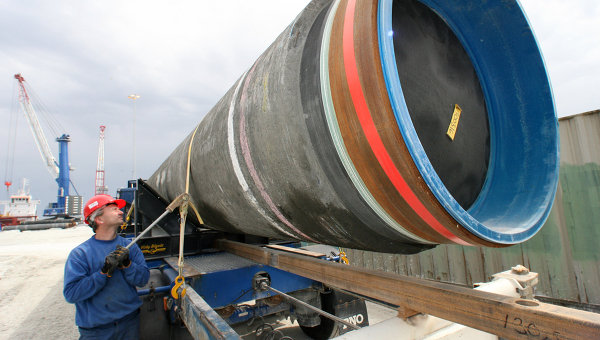
Bulgaria Terminates a Russian-led Energy Project, Discovers Natural Gas and Prospective Shale Gas Deposits
Publication: Eurasia Daily Monitor Volume: 8 Issue: 229
By:

The Bulgarian government quit a Russian-led pipeline project after a thorough review of key Russian energy projects in the country. Bulgaria is heavily dependent on Russian energy supplies and suffered hardship when Moscow cut Europe-bounded gas supplies to Ukraine in January 2009. Sofia has been criticized for insufficient effort to diversify its energy supplies and ensure energy independence. But recent discoveries of natural gas in northern Bulgaria and the prospect of rich shale gas deposits in the north-eastern part of the country may help the government reduce dependence on Russian energy sources. Concerned environmentalists, however, challenge shale gas exploration, while vested interest groups related to Russian energy deals feel threatened by the potential competition.
Amid complex internal political struggles and Russian pressure to protect its energy interests in the country, the Bulgarian government withdrew on December 7 from the Burgas-Alexandroupolis oil pipeline project, a joint undertaking of Russia, Bulgaria, and Greece (Standard, novinite.com, December 7). The project was designed to deliver Russian crude oil via tankers to the Bulgarian Black Sea port of Burgas, where it would have been transported via a pipeline to the Greek port of Alexandroupolis on the Aegean Sea, bypassing the Bosphorus Strait.
Sofia’s verdict on the project came two years after the Bulgarian center-right cabinet began to review three major Russian-led energy projects approved by the previous Socialist cabinet: the Burgas-Alexandroupolis oil pipeline, the South Stream gas pipeline project, and the Belene nuclear power plant. Upon taking office in July 2009, Prime Minister Boyko Borissov stated that the country would abandon the projects if they did not promote Bulgaria’s national interests.
Russia’s pursuit of submitting Bulgaria to its larger European ambitions and its own business interests dampened relations with Sofia, particularly after Borissov’s government came to power. The Socialist cabinet (2005-2009) was accommodating to Moscow to the point that on the eve of Bulgaria’s accession to the European Union (EU) in 2007, the Russian representative to the EU Vladimir Chizhov openly declared that “Bulgaria will be Russia’s Trojan horse in the EU” (Capital Weekly, November 10, 2006). In fact, by obtaining 51 percent ownership in the Bulgas-Alexandropoulis pipeline, Moscow was about to become a non-EU country exercising control over critical EU energy infrastructure.
But the real reason for Sofia to take a sober look at Russian-led energy deals is the business behavior of the Russian side that tried to maximize its benefits while disregarding the interests of its partners. For example, Russia did not want to tie the financing of the Burgas-Alexandroupolis pipeline to the future revenues from its exploitation, hence the project needed state subsidies that would not have been repaid (Capital Weekly, December 11). The initial plan, which included equal ownership of the three countries, guaranteed oil supplies and guaranteed project financing, was disregarded by Russia, which requested 51% shares in order to secure oil deliveries. The agreement signed in March 2007 by Bulgaria, Greece and Russia granted Moscow’s wishes, but “later it appeared that even this could not guarantee the economic feasibility of the project and that it could not be built using project financing,” according to Traicho Traikov, Minister of Economy, Energy and Tourism (Nova TV, December 8).
At present, only South Stream may have a chance to move forward after the government in Sofia declared it a “project of national importance” (24 Hours, Capital Daily, Duma, December 1). At the same time, both the Bulgarian government and parliament have stated strong support for the alternative Nabucco gas pipeline, promoted by the US and EU.
The fate of the Belene nuclear power plant is still unclear, although authorities in Sofia have indicated that the investment will not be cost effective. Bulgaria and Russia are still haggling about the price of Belene NPP, which is supposed to be constructed by Russian state company Atomstroyexport. President-elect Rosen Plevneliev, who served as Minister of Regional Development in the current government, stated that if Bulgaria is to issue financial guarantees for the construction of Belene NPP, the state might go bankrupt (Capital, December 11). His position is in stark contrast with that of the outgoing Socialist President Georgy Parvanov who criticized the latest developments in the Russian energy projects in Bulgaria, saying that “there is a lack of a serious expert debate on the Burgas-Alexandroupolis oil pipeline project and Belene NPP” (Trud, 24 Hours, Standart, December 11).
The leftist Duma Daily echoed criticism from the Socialists by quoting Plamen Rusev, the former CEO of Transbalkan Pipeline Bulgaria, the company in charge of constructing the Burgas-Alexandrupolis oil pipeline. He described the cabinet’s decision to withdraw from the project as economically detrimental for the country, but profitable for the US company Chevron, which will now be able to buy the Bulgarian share in the project at a negligible price (Duma, December 11).
The mention of Chevron is not by chance. The American company won a tender to start shale gas exploration in northern Bulgaria. If the initial estimates of shale gas deposits are confirmed, Bulgaria may have gas resources sufficient for 100 years – a prospect that frightens Russia’s Gazprom and other energy companies as well their Bulgarian partners. Since July, when the government announced that Chevron would start shale gas exploration, environmental protests started erupting in Sofia and cities in north-east Bulgaria. It seems that the population, which lacks information on the subject, has been manipulated to believe that shale gas exploration could cause environmental damage, ranging from water pollution to earthquakes.
In a move that would make Russia’s energy companies even more nervous, Minister Traikov announced in early December the discovery of a natural gas field near the town of Pleven by another US company, Transatlantic Petroleum (Trud, 24 Hours, Standart, December 11). Traikov asserted that the field could provide up to one billion cubic meters of natural gas annually, which is a third of the country’s consumption. He added that Bulgaria’s natural gas production will decrease the country’s dependence on Russian energy supplies.




